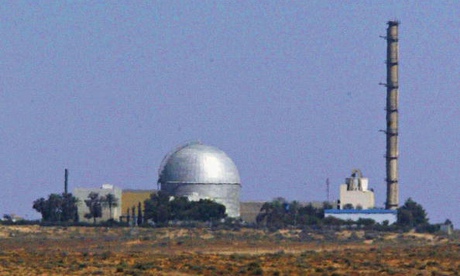 Deep beneath desert sands, an embattled Middle Eastern state has built a covert nuclear bomb, using technology and materials provided by friendly powers or stolen by a clandestine network of agents. It is the stuff of pulp thrillers and the sort of narrative often used to characterise the worst fears about the Iranian nuclear programme. In reality, though, neither US nor British intelligence believe Tehran has decided to build a bomb, and Iran's atomic projects are under constant international monitoring.
Deep beneath desert sands, an embattled Middle Eastern state has built a covert nuclear bomb, using technology and materials provided by friendly powers or stolen by a clandestine network of agents. It is the stuff of pulp thrillers and the sort of narrative often used to characterise the worst fears about the Iranian nuclear programme. In reality, though, neither US nor British intelligence believe Tehran has decided to build a bomb, and Iran's atomic projects are under constant international monitoring.
The exotic tale of the bomb hidden in the desert is a true story, though. It's just one that applies to another country. In an extraordinary feat of subterfuge, Israel managed to assemble an entire underground nuclear arsenal – now estimated at 80 warheads, on a par with India and Pakistan – and even tested a bomb nearly half a century ago, with a minimum of international outcry or even much public awareness of what it was doing.
Despite the fact that the Israel's nuclear programme has been an open secret since a disgruntled technician, Mordechai Vanunu, blew the whistle on it in 1986, the official Israeli position is still never to confirm or deny its existence.
When the former speaker of the Knesset, Avraham Burg, broke the taboo last month, declaring Israeli possession of both nuclear and chemical weapons and describing the official non-disclosure policy as "outdated and childish" a rightwing group formally called for a police investigation for treason.
Meanwhile, western governments have played along with the policy of "opacity" by avoiding all mention of the issue. In 2009, when a veteran Washington reporter, Helen Thomas, asked Barack Obama in the first month of his presidency if he knew of any country in the Middle East with nuclear weapons, he dodged the trapdoor by saying only that he did not wish to "speculate".





 President Donald Trump will announce a multi-billion dollar reconstruction plan for Gaza and detail plans for...
President Donald Trump will announce a multi-billion dollar reconstruction plan for Gaza and detail plans for... Alexandria Ocasio-Cortez has accused Donald Trump of tearing apart the transatlantic alliance with Europe and of...
Alexandria Ocasio-Cortez has accused Donald Trump of tearing apart the transatlantic alliance with Europe and of...






























